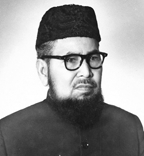Khan, Tamizuddin

Khan, Tamizuddin (1889-1963) politician, a noted minister of undivided Bengal, president of Pakistan Constituent Assembly and Speaker of the Pakistan National Assembly. Born in 1889 in a humble peasant family of Faridpur, the early life of Tamizuddin Khan reveals interesting insights in the odyssey of budding Muslims to carve out a place under limited opportunities under the colonial regime. His father's limited income from land was not enough to support his education. Tamizuddin had to find, like many Muslim students of the time, a jagir to prosecute his studies and later had to get married into a rich family to support his college education in Calcutta.
Tamizuddin Khan obtained an MA degree in English in 1913 and a law degree in 1915 and settled for legal profession in Faridpur. He took part in politics and was elected Vice-Chairman of Faridpur Municipality. He joined the indian national congress, also became Secretary of the Anjuman-i-Islamia and subsequently joined the muslim league. He participated in the Khilafat and non-cooperation movements and suffered imprisonment. In 1926 he was disappointed at his failure in the municipal election.
At the outbreak of Hindu-Muslim riots in various parts of India he got disillusioned with nationalist politics and devotef exclusively to Muslim politics.
Since 1920's the British government started extending franchise and include the upper segment of the peasantry into electoral politics. This made possible for Tamizuddin, having strong rural base, to come to the cynosure of all-Bengal politics. In 1926 he got elected to the Bengal Legislative Assembly from Faridpur defeating a Congressite Muslim landlord.
ak fazlul huq floated the krishak praja party in 1936. Tamizuddin Khan got elected from Faridpur under Muslim League ticket defeating his rival Congress candidate Humayun Kabir. Not being taken in the League - Praja Party coalition ministry he formed a new party called Independent Praja Samiti and clandestinely started negotiation with sarat bose, the leader of the Congress in the Bengal legislature. By mid June 1938 the Congress tabled a no-confidence motion against the ministry on the question of Bengal Tenancy Amendment Bill and Tamizuddin Khan, along with many disgruntled Praja leaders, backed the motion. However, the motion was defeated and Huq ministry survived. Thereafter Fazlul Huq decided to buy his position inviting Tamizuddin Khan in the cabinet. Initially he was given the portfolio of Medicine and Public Health, later, the ministry of Agriculture and Industries.
By 1941 a cleavage developed between Fazlul Huq and the Muslim League. Huq formed his second coalition ministry with shyama prasad mukherjI, the Hindu Mahasabha leader. Tamizuddin Khan joined the opposition in the Legislative Assembly with his other Muslim League colleagues.
In 1943, at the fall of Huq ministry a new coalition Ministry was formed under khwaja nazimuddin with the support of Independent Hindus and Europeans. Tamizuddin Khan became minister for education. In 1945, however, the government was defeated in a vote on a cut motion, and the Assembly was consequently dissolved.
Meanwhile the Muslim League made the demand for Pakistan its main issue. In the election of 1945 Tamizuddin was elected to the Central Assembly from Dhaka-Mymensingh constituency defeating abdul halim ghaznavi of Tangail. He was elected a member of the Pakistan Constituent Assembly. Later he was elected Deputy President of the Assembly with mohammed ali jinnah as President and on the latter's death in 1948 he became the President.
Tamizuddin Khan challenged the action of Ghulam Mohammad when he dissolved the Constituent Assembly in 1954; filed in the Sind Court a case entitled 'Tamizuddin Khan versus Federation of Pakistan' and won it. However, on appeal Federal Court dismissed the judgement of the Sind Court on the ground of 'state necessity', a dubious judgement.
Tamizuddin Khan, for some time, kept aloof from politics. He came back to active politics again and was elected an MNA under the 1962 constitution. He was elected the Speaker of the Pakistan National Assembly, the position he held till his death on 19 August 1963. [Manzur Ahsan]
